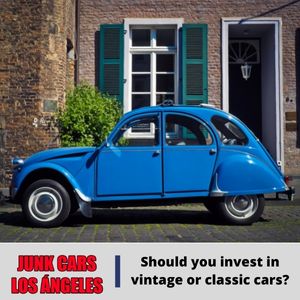There is no clear-cut answer when it comes to investing in classic cars.
On one hand, vintage cars can be a great investment because they often hold their value and sometimes even increase in price as the years go on.
However, there are also risks associated with buying and owning classic cars, such as the fact that they can be difficult to maintain and require a lot of time and money to keep looking their best.
So, when it comes to investing in classic cars, there is no clear-cut answer – it all depends on the individual’s priorities and what they’re looking for in a classic car.
Vintage cars can be a great investment if you find one in good condition, but they can also be quite expensive.
Classic cars are a safer investment, but they may not have as much potential for value growth. Ultimately, it depends on your personal preference!
When it comes to cars, there are two main categories: vintage and classic.
Classic cars are those that are over 20 years old, while vintage cars are from 1919.
It is important to do your research and find the right car that will hold its value over time.
Both have their pros and cons when it comes to investing, so let’s take a closer look at each one.
 What are vintage cars and why are they so popular right now?
What are vintage cars and why are they so popular right now?
Vintage cars refer to cars that were built between 1919 and 1930.
While the definition of vintage cars is not set in stone, it is generally agreed that these cars are classic vehicles that are no longer in production and have been discontinued by the manufacturer.
There are several reasons why vintage cars have become increasingly popular in recent years.
One of the main reasons why vintage cars have seen a resurgence in popularity is because they offer drivers a unique experience.
Unlike more modern cars, vintage cars often require more maintenance and care. This means that drivers who choose to drive a vintage car must be more involved in the car’s upkeep, which can be seen as a rewarding experience.
Additionally, selecting, restoring, and driving a vintage car can be seen as a rewarding experience because it allows drivers to connect with the automotive history.
Are vintage cars a good investment?
A vintage car is a classic car that has been restored and maintained in good condition. These cars are often prized for their beauty, rarity, and historical significance.
They can be quite expensive to purchase, but they can also be a good investment.
The value of a vintage car depends on several factors, including the make and model, the condition of the car, and the current market conditions.
Some vintage cars are more sought after than others, and they can be worth a lot of money.
If you’re thinking about investing in a vintage car, it’s important to do your research first. You need to find out what the car is worth and what the current market conditions are.
Vintage cars can be a good investment, but there are several things you need to consider before investing in a vintage car.
First of all, you need to do your research and find out what the car is worth. You also need to be aware of the current market conditions and the risks involved in investing in vintage cars.
Make sure you’re up to date on current rates by reading current buyer’s guides, many of which are available online.
When shopping for a vintage car, make sure you have up-to-date information and always have the vehicle inspected by a professional.
In the same way that you would have a technician inspect a used car before purchasing it from a private seller, having a certified appraiser inspect your antique automobile can help you get the most out of your investment.
Why are vintage car prices so high?
Several factors contribute to the high prices of vintage cars:
-
Limited supply:
One of the biggest factors is the limited supply. There are only a certain number of classic cars available, and as they become rare, their prices continue to go up.
The collectible car market has exploded with the passage of time and an ever-broadening enthusiast base.
The high prices are a reflection of how high the demand is for these automobiles.
Also, some of the older vehicles have hard-to-find parts. As a result, they are more expensive to fix.
-
Condition of the car:
Another factor that contributes to the high prices of vintage cars is the condition of the car.
A well-maintained vintage car can be worth a lot of money, while a car that is in poor condition can be worth very little.
For a vintage car to be considered valuable, it must be in excellent condition. This means that any damage or wear and tear on the car must be repaired to maintain its value.
Often, restoring a vintage car can be costly and time-consuming.
To preserve the car’s value, it is important to ensure that any damage is repaired and that the car is kept in excellent condition
What is considered a classic car?
A classic car is typically defined as a car that is at least 20 years old and that is no longer in production.
A classic car must be at least 20 years old and no more than 40 years old for insurance and registration requirements.
While the definition of a classic car is not set in stone, it is generally agreed that these cars are classic vehicles that have been discontinued by the manufacturer.
Are vintage cars and classic cars the same thing?
No, they aren’t.
Some of the language used in the classic and antique automobile hobby might be confusing to those who are new to the sport.
There is a lot of misunderstanding about what a “classic” automobile is and what distinguishes it from “vintage” and “antique” cars.
We’ve seen the term “classic” used interchangeably to describe just about any vintage automobile that appears to be out of place on the roads alongside modern-day drivers.
It is useful to understand the distinction while dealing with your automobile’s demands, such as registering your car, participating in car shows, and seeking a technician who can manage your car’s particular difficulties, among other things.
The following are the general guidelines for identifying classic, antique, and vintage cars:
- Vintage automobiles were manufactured between 1919 and 1930.
- Antique cars are those that are more than 45 years old.
- A classic car must be at least 20 years old and no more than 45 years old.
Is it worth investing in a classic car?
That’s a question many people are asking lately, and the answer is a bit complicated.
On the one hand, vintage cars can be extremely valuable and profitable investments. On the other hand, they can also be quite risky. It all depends on the condition of the car, the market for vintage cars
When it comes to making money with vintage cars, the condition of the vehicle is key. For a car to be considered valuable, it needs to be in good condition.
If it’s been restored or modified, that’s even better.
However, if the car is in poor condition, it will likely be worth much less than a restored or modified car.
It may not be worth anything at all. This is why it’s important to take good care of your vintage car and ensure that it’s always in good condition.
Classic vehicles, in general, appreciate more than other sorts of collectibles, even though they require more upkeep and are more difficult to store than stamps or comic books.
The correct old automobile might be worth millions of dollars.
Due to rising worldwide wealth pursuing a limited number of vehicles, the market for historic automobiles has outperformed collectibles such as coins and stamps over the last decade, often even outperforming the overall stock index.
Several indices are used by the Historic Automobile Group International (HAGI) to track the collector automobile market.
The HAGI Top Index, which tracks antique collectible automobiles from Porsche, Ferrari, Bugatti, Alfa Romeo, and other companies, is its widest.
From its launch in December 2008 to December 2021, the HAGI Top Index increased by about 264.49 percent.
How much do classic cars appreciate?
When it comes to historic automobiles, there’s no denying that they appreciate with time.
According to Vanarama’s research on affordable classics (both modern and traditional), the average value rose over a decade was 97 percent.
If that sounds like an inordinate amount of time, the correct automobile may nevertheless add 33% to its value by merely staying in storage for half that period.
The value of a vintage car can go up or down depending on several factors, but over time, classic cars tend to appreciate.
This is because there is a limited supply of classic cars and they are becoming rarer.
The current market conditions also play a role in the appreciation of vintage cars.
When the economy is strong, people have more money to spend on luxury items, and vintage cars are often considered luxury items.
This drives up the demand for vintage cars and causes their value to appreciate.
However, when the economy is weak, people have less money to spend on luxury items, and vintage cars are often considered luxury items.
This drives down the demand for vintage cars and causes their value to depreciate.
When it comes to classic cars, there is no single answer to the question of how much they appreciate it. The value of a classic car depends on several factors, such as its age, condition, and rarity.
Generally speaking, however, classic cars tend to appreciate at a faster rate than the rate of inflation.
Will classic cars become worthless?
Classic cars have been known to hold their value over time, but there is no guarantee that this will always be the case.
There is a risk that the value of classic cars could go down in the future, especially if the economy tanks.
However, there is also a risk that the value of classic cars could go up in the future.
While it is impossible to say for certain what will happen to the value of classic cars in the future, there is a good chance that they will continue to appreciate at a rate that is faster than the rate of inflation.
This is because the number of classic cars available on the market continues to decrease as they become rarer and rarer.
Despite plans in many countries for new emissions regulations, classic cars will not become valueless.
Only new cars will be affected by the changes in regulations, so classic cars will retain their value.
Additionally, many people see driving a classic car as a rewarding experience, which contributes to the high prices that these vehicles often command.
How do you buy a classic or vintage car?
When it comes to buying a classic or vintage car, there are a few things you need to keep in mind.
-
Step 1: Look for classic or vintage cars for sale on the internet.
When it comes to buying a classic or vintage car, the internet is a great place to start.
There are several websites where you can find vintage or classic cars for sale, and it’s a great way to compare prices and find the best deal.
Some of the greatest websites are Hemmings, Autotrader, and eBay.
When shopping for a car online, be sure to do your research. You need to know what the car is worth and what the current market conditions are.
-
Step 2: Before you buy, take a good check at the vehicle.
When buying a classic or vintage car, it’s important to do your research and inspect the vehicle carefully before making any decisions.
Make sure to look for any damage or wear and tear that may not be immediately visible. Also, take into account the condition of the car and whether or not it needs any repairs.
This will help you make sure that you’re getting the car you want, and it will also help you avoid any potential problems down the road.
When inspecting a vintage car, be sure to check the following:
-The condition of the body
-The condition of the engine
-The condition of the tires
-The condition of the interior and exterior.
– Painting.
Also, examine the vehicle’s history and determine if the Vehicle Identification Number (VIN) corresponds to the serial numbers of the engine, transmission, and rear axle.
If they all match, the engine, gearbox, and rear axle will be stamped with the VIN’s last six numbers.
If they don’t match, it simply signifies they aren’t original parts, and the automobile will be of less value as a result.
-
Step 3: Determine the fair market value of the vehicle.
When shopping for a vintage or classic car, it’s important to know the fair market value of the vehicle.
This will help you avoid overspending on a car that may not be worth as much as you think. By knowing the fair market value, you’ll be able to negotiate a better price with the seller.
Some websites can assist in estimating the fair market value of a vehicle. Some well-known websites are: Hemmings, NADA Guides and Haggerty
-
Step 4: Determine the cost of the restoration.
You need to determine how much the restoration will cost. This will help you budget for the project and make sure you have enough money to get the job done.
When it comes to restoring a classic or vintage car, the cost can vary depending on the car and the extent of the work that needs to be done.
In most cases, it’s important to factor in the cost of parts and labor when estimating how much restoration will cost.
To come up with a cost estimate, find out what items you’ll need, how much they’ll cost, and acquire quotes for any work that will need to be done by specialists.
-
Step 5: Purchase your vintage or classic automobile.
Offer 5% to 10% less than fair market value and be willing to bargain. When negotiating the price, use your cost estimate.
If the vendor understands how much more you intend to invest, he or she may be more ready to lower the price.
If you do not know the buyer, it is recommended that you meet in a public place and that you are accompanied by someone.
In this way, you will avoid any problem.
Can you find classic or vintage cars in junkyards?
Yes, you can find classic and vintage cars in junkyards.
While it can be difficult to find classic or vintage cars for sale, you may be able to find them in junkyards.
In most cases, these cars will be in rough condition and will require a lot of restoration work. However, it can be a great way to get a car for a fraction of the price.
By inspecting the car before you buy it, you can get a better idea of its condition.
These vehicles are often much less expensive than newer cars, and they can be just as reliable.
Additionally, restoring a vintage or classic car can be a lot of fun, and it can be a great way to learn more about cars.
Do you want to look for classic or vintage cars in Junk Cars Los Angeles?
If you’re looking for a classic or vintage car, Junk Cars Los Angeles is the place to be. We have a wide selection of cars to choose from, and we offer some of the best prices in town.
So whether you’re looking for a project car or you just want to drive something different, we can help you find the perfect car for you!
Just make sure you inspect the car carefully before making a purchase. We want to make sure you get the best car for your money. Call us at 323-205-7761

